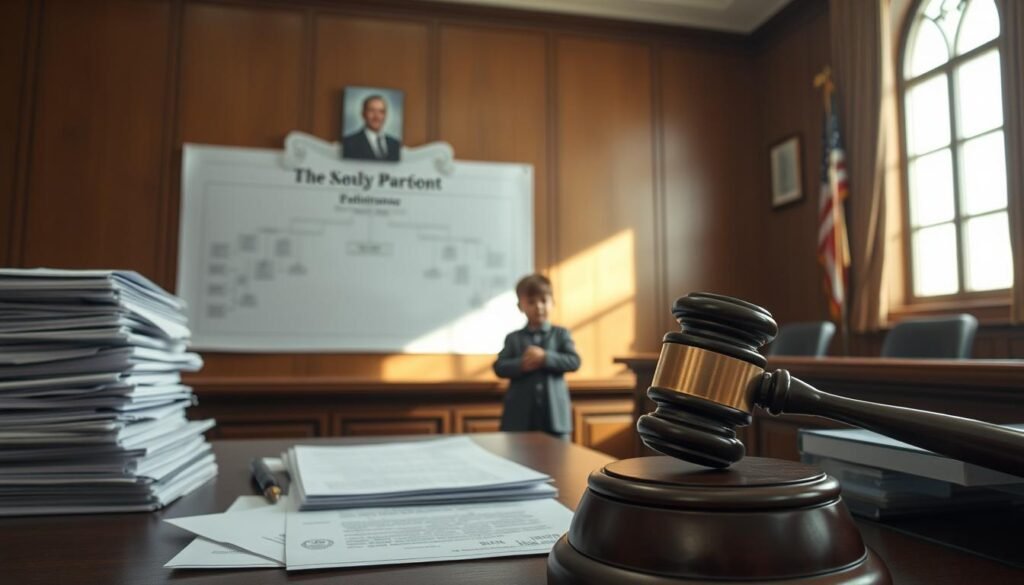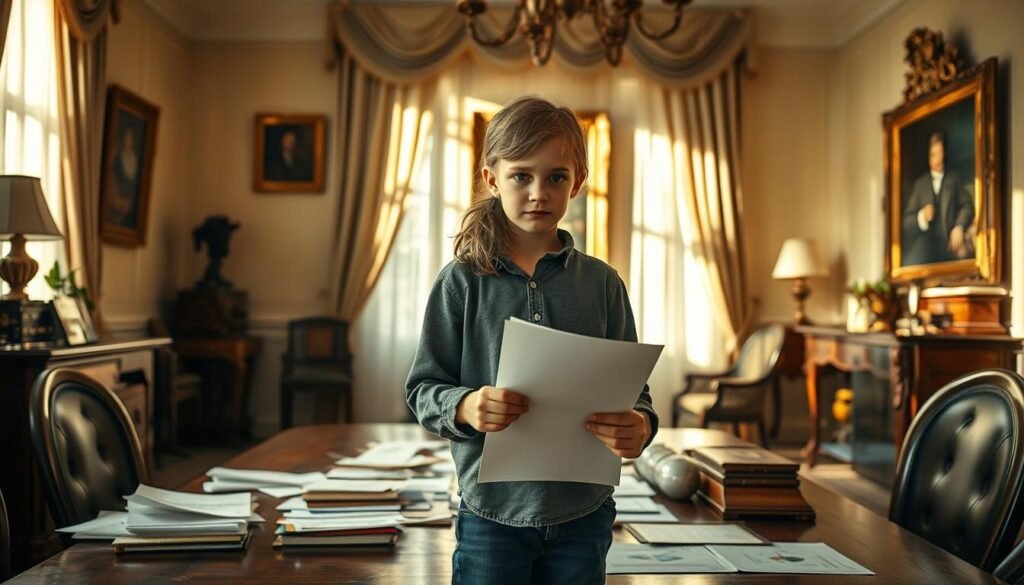When we talk about inheritance laws, a common question is who can challenge a will. We’re looking at a complex issue: can a grandchild fight a will if their parent has died? This situation involves deep probate law and the rights of those who might inherit.
In estate planning, knowing who can inherit is key. We’ll look at what makes a grandchild eligible to challenge a will. This exploration will help us understand their rights in such sensitive matters.
Key Takeaways
- Grandchildren’s rights in contesting wills depend on specific circumstances
- Legal standing is a crucial factor in will contests
- Inheritance laws vary by state and affect grandchildren’s rights
- The deceased parent’s status impacts a grandchild’s claim
- Valid grounds are necessary for contesting a will as a grandchild
- Understanding probate law is essential for potential will contests
Understanding Grandchildren’s Legal Standing in Will Contests
In estate litigation, grandchildren’s rights can be complex. We’ll explore how probate court proceedings handle these cases, especially when a grandchild’s parent has passed away.
The Concept of Standing in Probate Law
Standing is crucial in estate litigation. It determines who can challenge a will. For grandchildren, this often depends on their deceased parent’s position in the family tree. Probate courts look at family relationships closely when deciding who has the right to contest.

Rights of Grandchildren as Potential Heirs
Grandchildren may have inheritance rights, but these vary by state. Some laws treat grandchildren as direct heirs if their parent has died. Others may not automatically include them. Understanding these rules is key in estate litigation.
Impact of Parent’s Death on Inheritance Rights
When a parent dies before a grandparent, it can change a grandchild’s legal position. This situation, known as representation, may give grandchildren the right to their parent’s share. Probate court proceedings consider these family changes when reviewing wills and deciding on contests.
| Scenario | Grandchild’s Standing | Potential Outcome |
|---|---|---|
| Parent alive | Limited | Unlikely to contest |
| Parent deceased | Possible | May contest if representing parent |
| Named in will | Strong | Can contest if terms unfavorable |
Navigating grandchildren’s rights in estate litigation requires careful consideration of family dynamics and state laws. Expert legal guidance can be invaluable in these complex probate court proceedings.
Can a Grandchild Contest a Will If Their Parent Is Deceased
Grandchildren face unique challenges when contesting wills, especially if their parent has passed away. The legal landscape can be complex, but understanding your rights is crucial. We’ll explore the circumstances that allow grandchildren to challenge a will and claim their deceased parent’s share.
Inheritance laws vary by state, but generally, grandchildren may contest a will if their parent would have been entitled to inherit. This situation often arises when a grandparent’s will doesn’t account for a predeceased child. In such cases, the grandchild might step into their parent’s place in the inheritance line.

- The deceased’s intent as expressed in the will
- State-specific inheritance laws
- The relationship between the grandchild and grandparent
- Any prior financial support or promises made
It’s important to note that contesting wills can be a lengthy and costly process. Grandchildren must weigh the potential benefits against the emotional and financial costs involved.
| Factor | Impact on Will Contest |
|---|---|
| Clear will language | Reduces chances of successful contest |
| Evidence of close relationship | Strengthens grandchild’s claim |
| State laws favoring lineal descendants | Improves odds for grandchildren |
| Lack of other heirs | May increase grandchild’s inheritance share |
Consulting with a probate attorney is crucial for grandchildren considering contesting a will. They can provide guidance on the specific inheritance laws applicable to your situation and help evaluate the strength of your claim.
Legal Grounds for Contesting a Will as a Grandchild
Grandchildren can challenge a will if they have good reasons. We’ll look at the main reasons a grandchild might have to fight a will in court.
Lack of Testamentary Capacity
This happens when the person making the will can’t understand what they’re doing. Grandchildren might say their grandparent wasn’t thinking clearly when they made the will.
Undue Influence or Coercion
Someone might have forced the grandparent to change their will. This could mean keeping them away from family or taking advantage of their weak spots.
Fraudulent Activity
Fraud can happen in many ways. It might include fake signatures, lies, or tricks that made the grandparent make choices they wouldn’t have otherwise.
Improper Will Execution
Every state has rules for making a will. If these rules weren’t followed, like not having the right witnesses, the will could be thrown out in court.
Knowing these reasons is key for grandchildren thinking about contesting a will. It’s vital to have solid evidence to back up your claims in court.
The Role of Intestate Succession Laws
When someone dies without a will, intestate succession laws kick in. These laws decide how assets are split among heirs and beneficiaries. Let’s dive into the main points of these laws and how they affect grandchildren’s rights.
State-Specific Inheritance Rules
Intestate succession laws differ by state. Each place has its own rules for dividing property without a will. Usually, the first in line are spouses and children. If a grandchild’s parent has died, they might get something.
Per Stirpes vs. Per Capita Distribution
There are two main ways to split an estate without a will: per stirpes and per capita. Per stirpes means the estate goes to the deceased’s children, with any child’s share going to their kids. Per capita splits the estate among all descendants of the same generation.
Impact on Grandchildren’s Rights
Grandchildren’s rights in these situations depend on several things. If their parent is alive, they don’t get anything directly. But if their parent has died, they might inherit. Knowing these laws is key for grandchildren wanting their share of an estate.
Time Limitations and Procedural Requirements
Time is crucial when contesting wills. Grandchildren must act quickly within the legal timeframes set by state laws. These deadlines are key in probate court and vary by state.
The time to contest wills usually ranges from a few months to a year after probate. Missing this deadline means losing your chance to challenge the will, no matter how strong your case is.
To start estate litigation, you must file a formal petition with the probate court. This petition should explain why you’re contesting the will and include evidence. It’s important to collect all needed documents, such as:
- A copy of the contested will
- Death certificate of the deceased
- Proof of your relationship to the deceased
- Any evidence supporting your claims
Probate court proceedings can be complex. You might need a lawyer to help. An experienced attorney can guide you through the process and ensure you meet all requirements.
| Requirement | Description |
|---|---|
| Filing Deadline | Typically 3-12 months after probate begins |
| Legal Standing | Must prove potential inheritance rights |
| Petition Filing | Formal document outlining contest grounds |
| Evidence Submission | All supporting documents and testimonies |
Understanding these time limits and steps can help grandchildren prepare to contest wills. It’s a way to protect their potential inheritance rights.
Proving Your Case in Probate Court
Proving your case in probate court is key when challenging a will. We know how tough estate litigation can be. We’re here to help you understand the process.
Required Documentation
To start probate court proceedings, you’ll need certain documents:
- Original will and any codicils
- Death certificate
- Financial records
- Medical records (if alleging lack of capacity)
- Witness statements
Burden of Proof Standards
In estate litigation, the person contesting the will bears the burden of proof. You must show clear and convincing evidence to back your claims. This is a higher standard than in most civil cases but less than in criminal ones.
Expert Testimony Requirements
Expert witnesses are crucial in will contests. They offer professional opinions on:
| Expert Type | Testimony Focus |
|---|---|
| Medical Professionals | Testator’s mental capacity |
| Forensic Document Examiners | Will authenticity |
| Financial Analysts | Asset valuation |
| Psychologists | Undue influence assessment |
Every probate case is different. Talking to an experienced attorney can help. They can guide you through the challenges of contesting a will and boost your chances in court.
Strategies for Successful Will Contests
Contesting wills can be complex, especially for grandchildren. We’ve gathered effective strategies to help you through estate litigation and inheritance laws.
Gather strong evidence to support your claim. This includes medical records, witness statements, and financial documents. These can prove crucial in showing lack of capacity or undue influence.
Work with experienced probate attorneys. They know the details of estate litigation and can guide you. Their expertise can greatly improve your chances of success.
Understand time limits. Each state has specific deadlines for contesting wills. Missing these can result in losing your right to challenge, regardless of your case’s merit.
| Strategy | Importance | Potential Impact |
|---|---|---|
| Gather Evidence | High | Strengthens your case |
| Hire Experienced Attorney | Critical | Improves success chances |
| Meet Deadlines | Essential | Preserves right to contest |
| Understand Grounds | Vital | Focuses your argument |
Familiarize yourself with valid grounds for contesting. These include lack of testamentary capacity, undue influence, fraud, or improper execution. Knowing these can help you build a stronger case.
Be prepared for a lengthy process. Will contests often take time and can be emotionally draining. Staying patient and focused on your goal is key to navigating this challenging journey.
Conclusion
Understanding inheritance laws and grandchildren’s rights can be tricky, especially when fighting against wills. We’ve looked into the legal reasons and steps involved. It’s clear that grandchildren might have the right to challenge a will if their parent has died, but certain conditions must be met.
Knowing the details of probate law, who can challenge, and state rules is key. These elements are crucial for winning a will contest. Grandchildren need to know about deadlines and how to follow the right steps to protect their rights.
Because of the complexity of inheritance laws, getting legal help is important. At Heritance Law, we focus on helping families through tough times. Our team is here to help you fight for your inheritance and guide you through the process.

